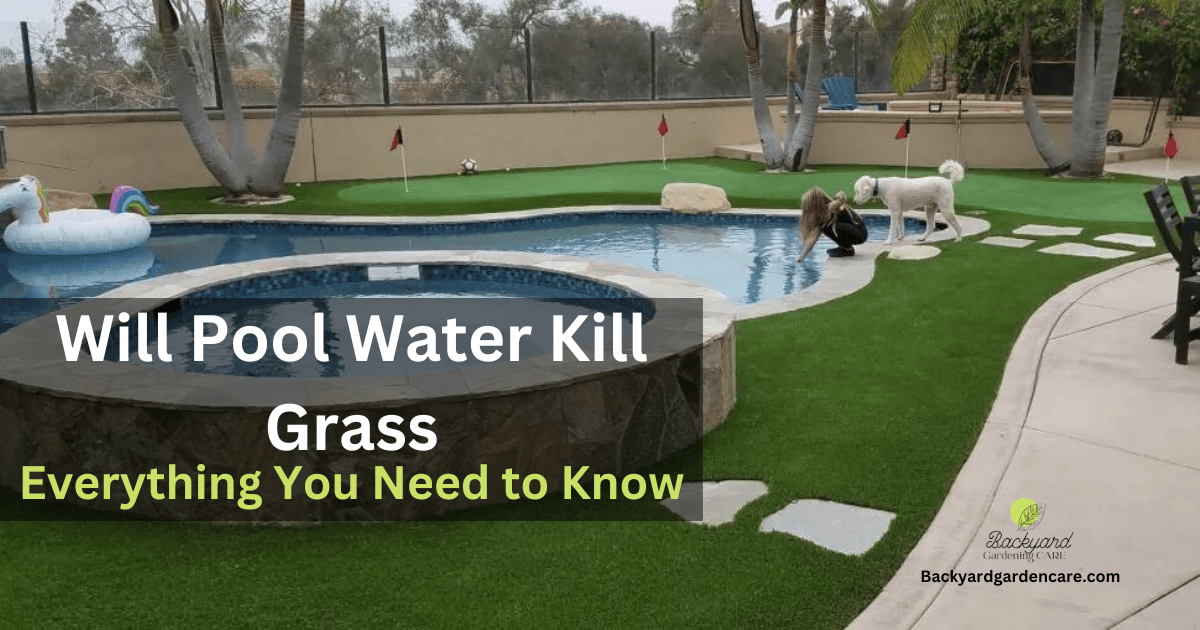Will Pool Water Kill Grass? 3 Main Problems You Need to Know.
One common concern for homeowners with pools is whether the pool water can harm their grass. Fortunately, very little to no damage will occur to the lawn in most cases.
The potential issues that may arise from pool water in your landscaping are typically a result of excessive chlorine or salt content. Understanding the factors can help homeowners mitigate potential damage.
This article will delve into the question, “Will pool water kill grass?” and explore the reasons why it may or may not be harmful to your lawn.
Let’s get started.
The Impact of Pool Water on Grass.
The impact of pool water on your yard can be quite detrimental if certain factors are not properly managed. One of the main issues that can arise is a pH imbalance in the soil or dead grass due to a high chlorine concentration.
When the chlorine levels are too high, it can disrupt the pH levels in the soil, leading to an imbalance that can negatively affect the health of your yard.
It’s worth noting that grass has the ability to absorb certain nutrients while avoiding others that may be harmful, but when there is an excessive amount of chlorine, it can hinder this process and cause damage to the grass.
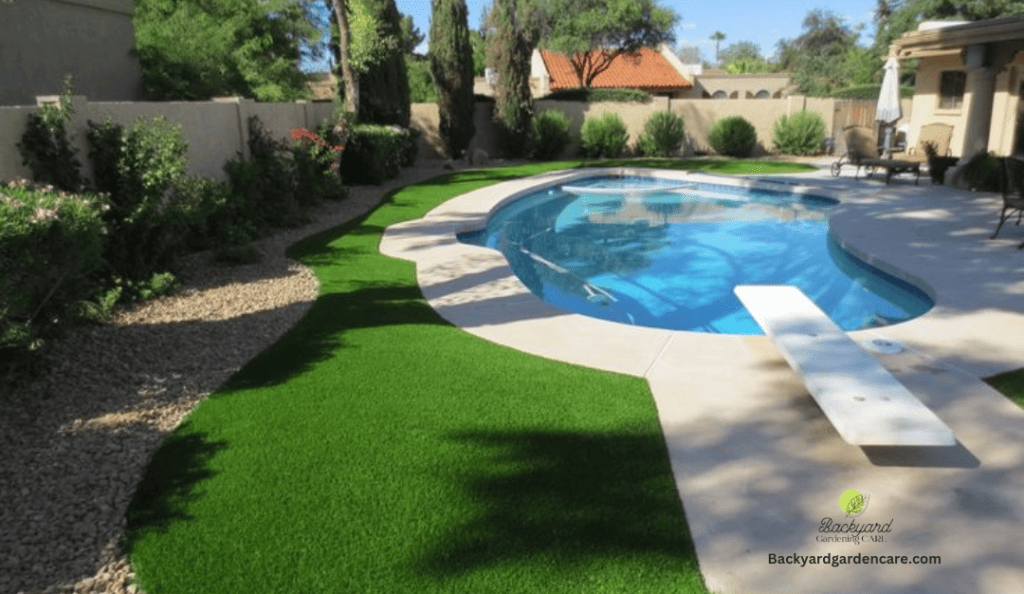
On the other hand, if you have a saltwater pool, the impact on your yard can be slightly different. Will salt pool water kill grass: Salt is naturally present in the ground in small amounts; increasing salt levels can make it difficult for plants to obtain the necessary nutrients and water.
The salt tends to retain these essential elements, depriving the plants of what they need to thrive. This can result in poor growth and the overall decline of your yard.
If you find that your soil has accumulated an excessive amount of salt, there are steps you can take to reduce the damage. One option is to wash away the salt by washing the affected area with fresh water. This can help to flush out the excess salt and restore a healthier balance in the soil.
Furthermore, if your yard has a high clay content, the salt may cause the soil to become compacted. To address this issue, you can add gypsum, which helps to loosen the soil and improve its structure.
Will Pool Water Kill Grass?
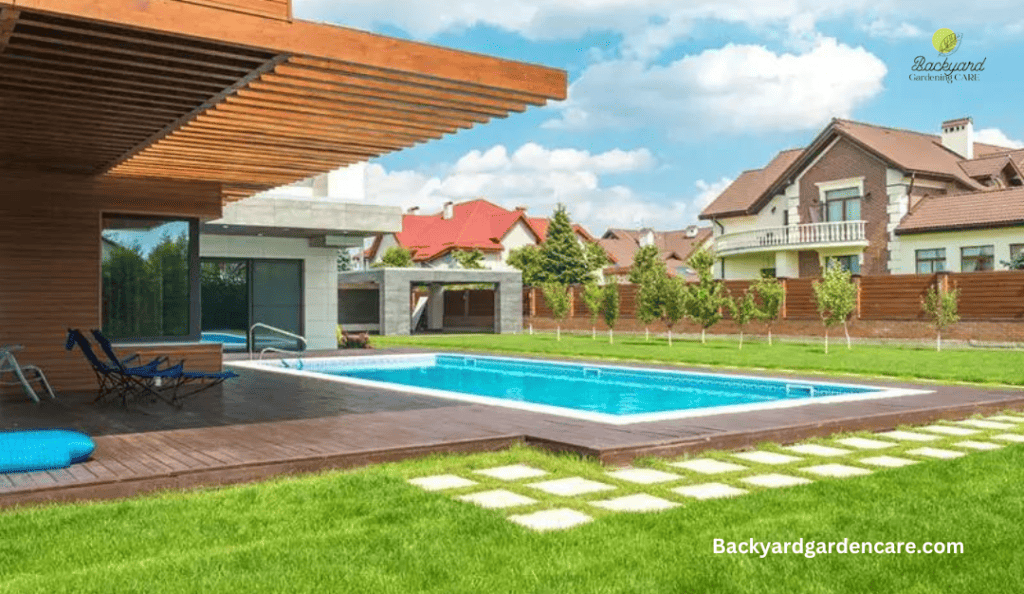
Pool water can indeed harm grass due to the presence of chlorine and other chemicals that are used to maintain the cleanliness of the pool. Apart from chlorine, substances like bromine and algaecides are often added to pool water, and these can have a detrimental effect on grass if they come into contact with it. Additionally, pool water can also affect your lawn by making it appear consistently wet.
It is worth noting that even saltwater pools can pose a threat to grass, as the salt content can lead to dehydration and ultimately kill the grass. Therefore, taking precautions to protect your grass if you have a pool in your backyard is important.
Chlorine Water
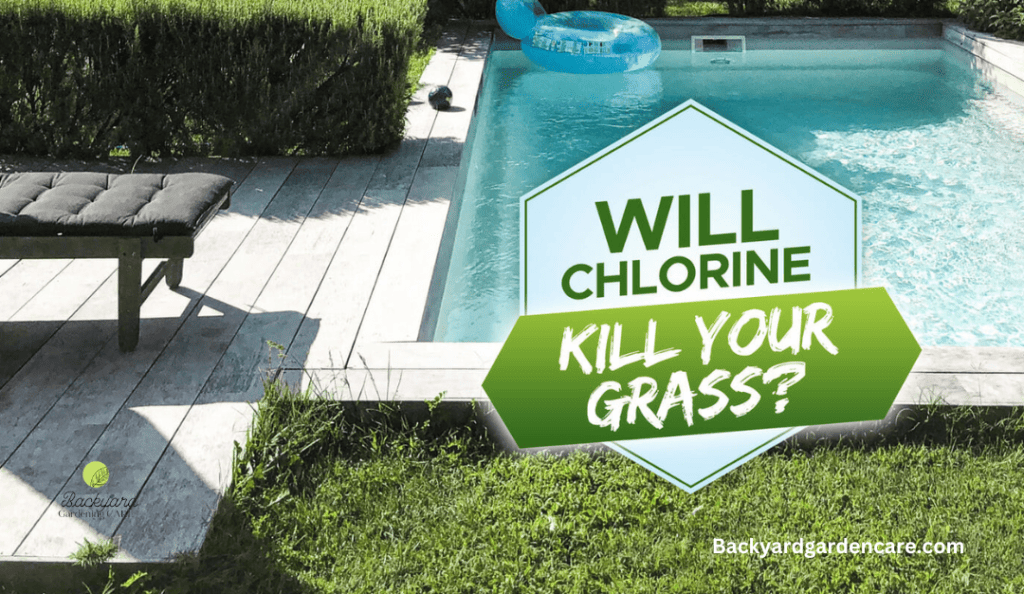
Maintaining a clean pool requires chlorine to prevent harmful microbes from growing in the water. However, it is important to understand that chlorine can have negative effects on grass and plants if not properly managed.
In my own experience as a pool owner, I’ve witnessed firsthand the impact of chlorine on the surrounding lawn. Even small amounts of chlorine in pool water, exceeding 0.1 parts per million, can be toxic to grass and plants. The presence of chlorine can disrupt the natural balance of the soil, making it difficult for grass and nitrogen-producing bacteria to thrive. I noticed patches of dry and brittle grass near the pool, which was a clear indication of chlorine damage.
Furthermore, during a discussion with my friend, who is an experienced gardener, he shared his perspective on this issue. He emphasized that chlorine’s absorption by grass roots can lead to grass becoming brittle and dry, further damaging its overall health. He also mentioned that chlorine toxicity can result in the rapid dissolution of minerals and nutrients from the soil, which are essential for grass to remain healthy and resilient.
Both my personal experience and my friend’s input highlight the importance of addressing chlorine’s impact on grass and plants. These effects can be long-lasting and even permanent if not managed properly. Therefore, pool owners must take proactive measures to minimize the impact of chlorine on nearby vegetation.
One effective way to mitigate these effects is by ensuring proper pool maintenance and regularly monitoring chlorine levels. By testing the water and adjusting the chlorine dosage accordingly, pool owners can prevent excessive amounts of chlorine from entering the pool and damaging the surrounding landscape.
Algaecides
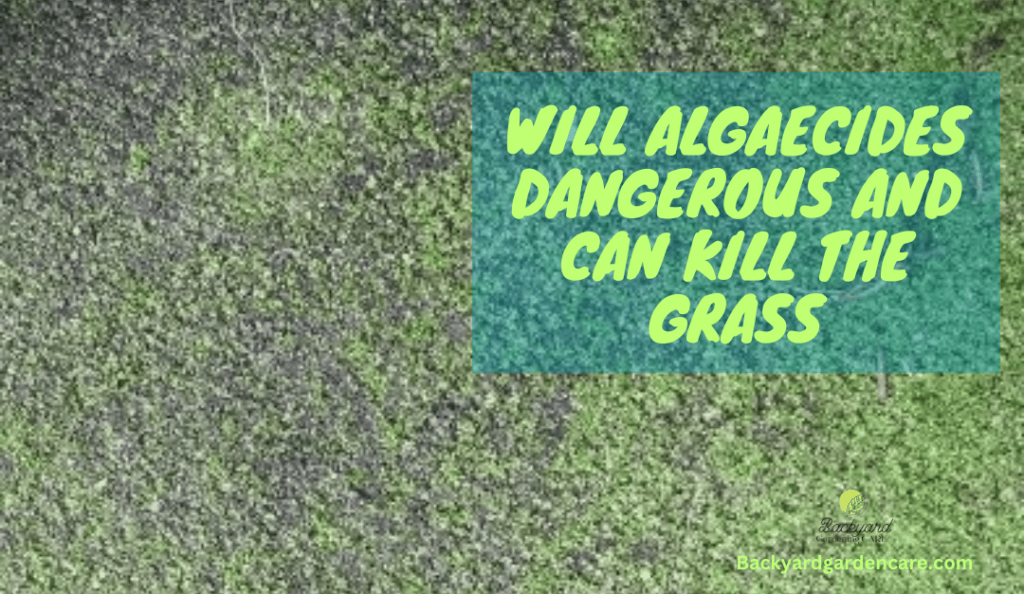
Algaecides are chemicals used in chlorinated pool water to prevent the growth of algae. However, using water mixed with algaecides for irrigation purposes can have negative effects on the soil and the grass even if the water is left for a short period,
Algaecides that contain copper can cause stunted growth in all plants growing in the lawn. This can harm the overall growth and spread of the grass, even if it is well taken care of. The irrigation process further affects the grass, fading its green color and a lacklustre appearance.
In some cases, algaecides may also contain bleach or added chlorine. These chemicals are even more dangerous and can kill the grass, especially if recently added to the pool.
During this active process, the chemicals can harm the grass, further compromising its health and appearance. Therefore, it is important to be cautious when using water mixed with algaecides for irrigation purposes because Will pool water kill plants.
Alternatives such as using untreated water or finding organic solutions to prevent algae growth should be considered to maintain the health and vitality of the grass and soil.
Will Pool Water Kill Plants Due to Bromine?
Bromine is a commonly used element in pool water for its disinfectant properties. It is added to pool water to ensure hygiene and prevent the growth of harmful bacteria. However, it is important to note that if this water, containing bromine, is used for irrigating the grass, it can have detrimental effects on the lawn.
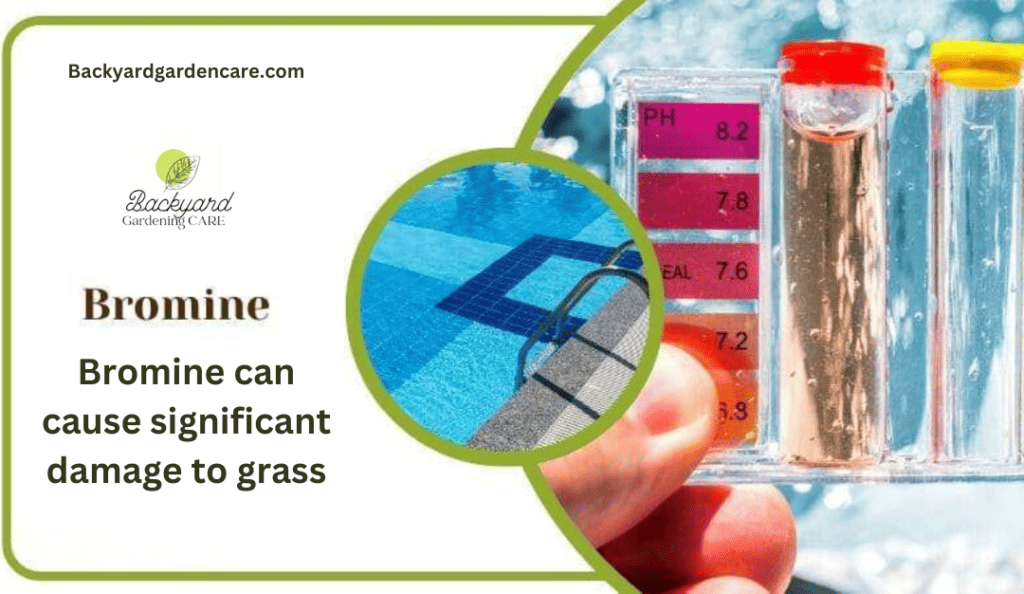
Water infused with bromine can cause significant damage to grass if splashed in large amounts. The bromine seeps deep into the soil through the water and directly attacks the roots of the grass.
This can lead to the roots being damaged, which in turn disrupts the smooth flow of nutrients to the grass. As a result, the grass may begin to die permanently, leaving behind yellow patchy areas in the lawn.
It is essential to exercise caution when using water treated with bromine on your lawn. While bromine serves its purpose in keeping pool water clean and clear, its application to grass can have unintended consequences, such as lawn deterioration.
Therefore, it is advisable to avoid rinsing the grass with water containing bromine to ensure the health and vitality of your lawn. Maintaining a healthy and vibrant lawn requires appropriate watering practices.
Using clean and untreated water, such as tap water, is generally the best option for irrigating the grass. This will help ensure the grass receives nutrients and water without harmful chemicals that can negatively impact its growth.
What Is the Best Way To Use Pool Water for Grass Watering?
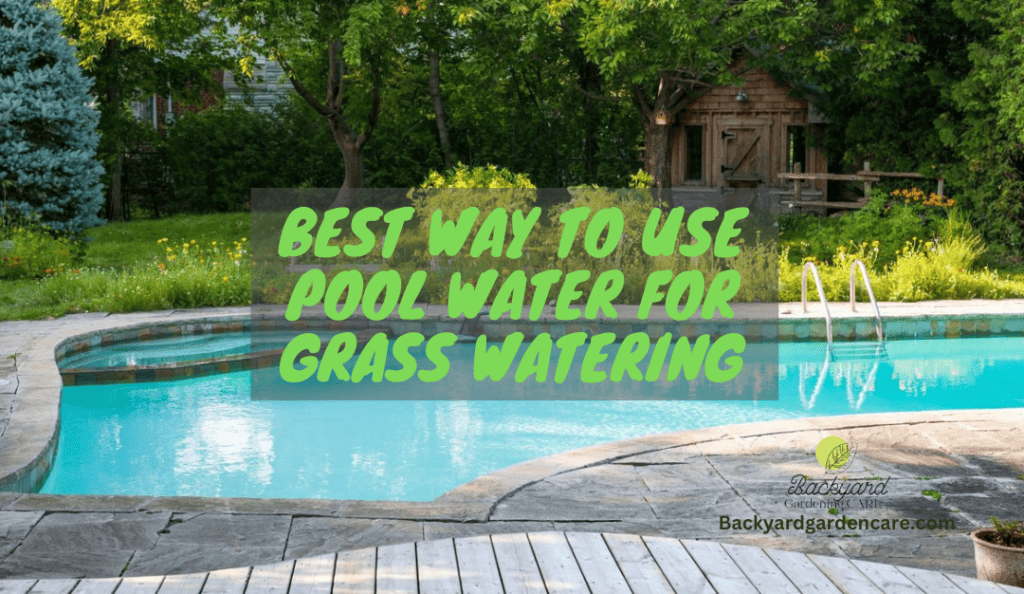
Using pool water for grass irrigation can be a safe and sustainable option by reducing the chlorine content before draining it. This ensures that the water is suitable for watering salt-tolerant plants and grass.
It is important to decrease the chlorine levels even if you plan to use the water for other purposes; additionally, monitor the water quantity for the grass as it is crucial to prioritize safety. Chlorine is a volatile compound that naturally evaporates over time.
Exposing the pool water to air is recommended to expedite the reduction of chlorine levels. Utilize the pool, engage in swimming activities within it, and ensure that the water remains exposed to the air to expedite the reduction of its chlorine levels.
When it comes to reducing chlorine levels in pool water, bright sunlight plays a significant role. The exposure of pool water to direct sunlight helps chlorine dissipate at an accelerated pace.
In fact, just two hours of direct sunlight exposure can reduce chlorine levels by as much as 90 percent. This is because chlorine evaporates, and sunlight promotes its evaporation. Additionally, heat can also aid in the removal of chlorine from pool water.
Increasing the water temperature in the pool to 100 degrees Fahrenheit or higher than the recommended levels can help eliminate chlorine rapidly. The combination of heat and sunlight provides an effective means of reducing chlorine content in pool water.
Following these methods, you can safely repurpose pool water for grass irrigation. Remember to decrease the chlorine levels by exposing the water to air and using sunlight and heat to expedite the chlorine release process.
Conclusion
It is clear that pool water can indeed have a negative impact on grass. The high levels of chlorine and other chemicals present in pool water can be detrimental to the health and growth of grass, causing it to turn yellow, wither, and eventually die.
Additionally, the heavy concentration of salt in saltwater pools can also lead to damage to surrounding grass. It is important for pool owners to take precautions and careful application of pool water to minimize the impact on grass.
Ultimately, it is possible to maintain a healthy and vibrant lawn while enjoying a pool by being aware of the potential risks and taking the necessary precautions.
FAQs
Can I Put Pool Water on My Grass?
Yes, you can put pool water on your grass. However, it’s important to consider the chlorine levels and chemicals in the water. Reducing the chlorine level water is recommended to minimize any potential damage to the grass.
Is Pool Water Bad for Grass and Plants?
Yes, pool water can be bad for grass and plants if it contains high chlorine levels or other chemicals. These chemicals can cause discoloration, burning, and even death of the grass and plants. It is important to properly manage and treat pool water to avoid damaging surrounding vegetation.
How Do I Stop My Pool Water From Killing My Grass?
To prevent pool water from harming your grass, you can try the following methods: properly balance the pool chemicals and avoid over-watering the grass. Regularly test and adjust the pool’s pH and chlorine levels, and avoid splashing or overwatering the grass with the pool water.
Is Pool Water Good for Watering Plants?
Pool water is not generally recommended for watering plants. Most pool water contains chemicals like chlorine and other disinfectants, which can harm plants.
These chemicals can disrupt the balance of nutrients in the soil and potentially damage plant roots. Using fresh, clean water for watering plants is best to ensure their health and growth.
Jack Ralph

hey, I’m Jack Ralph, a dedicated grass and lawn expert with years of experience creating beautiful outdoor spaces. I can help you achieve the lawn of your dreams, from seeding to mowing, turning your yard into a natural masterpiece.
Look no further—I’m the key to transforming your lawn dreams into reality! and here to help you achieve a lawn that’s not just a patch of grass, but a canvas of natural artistry.

